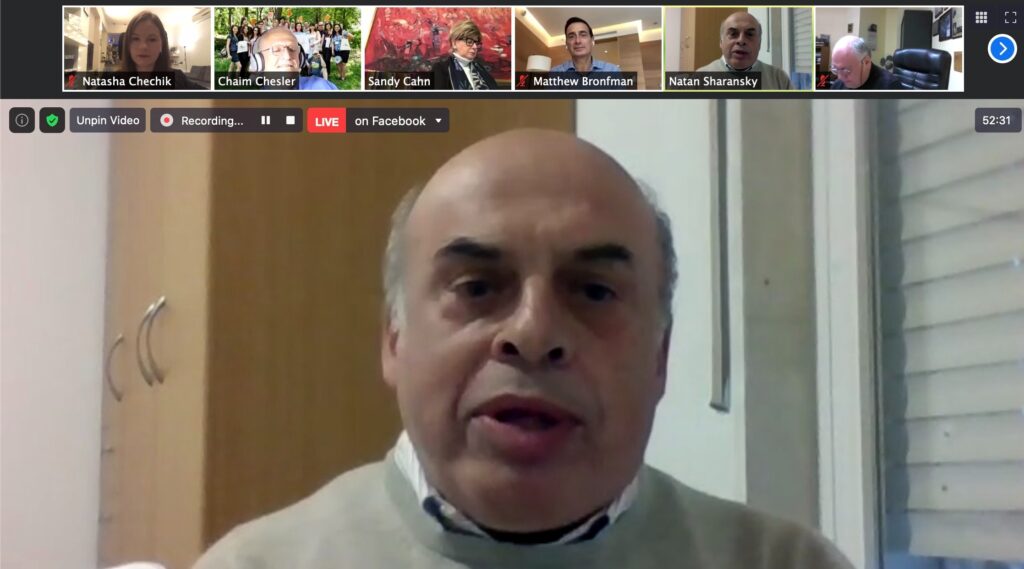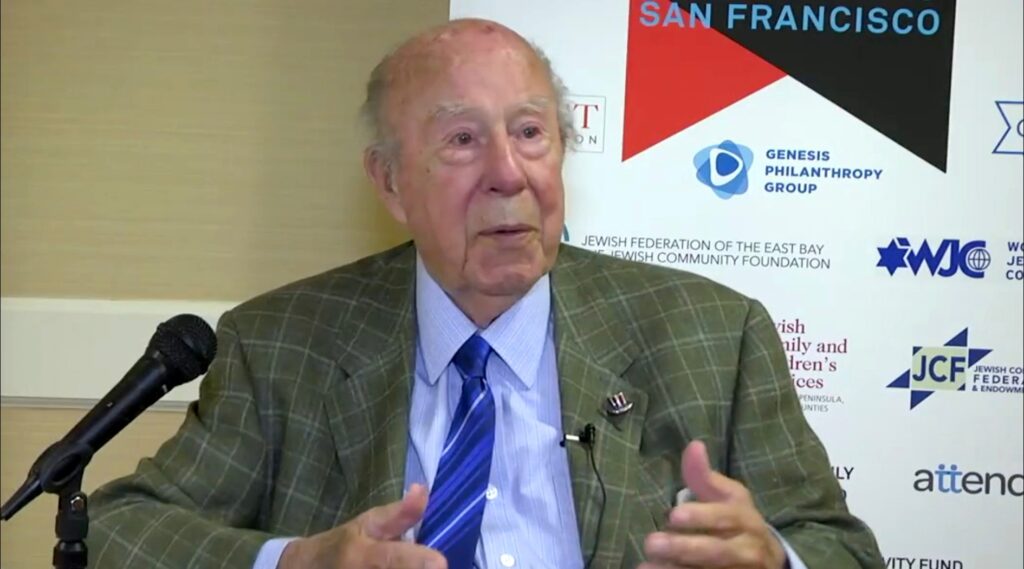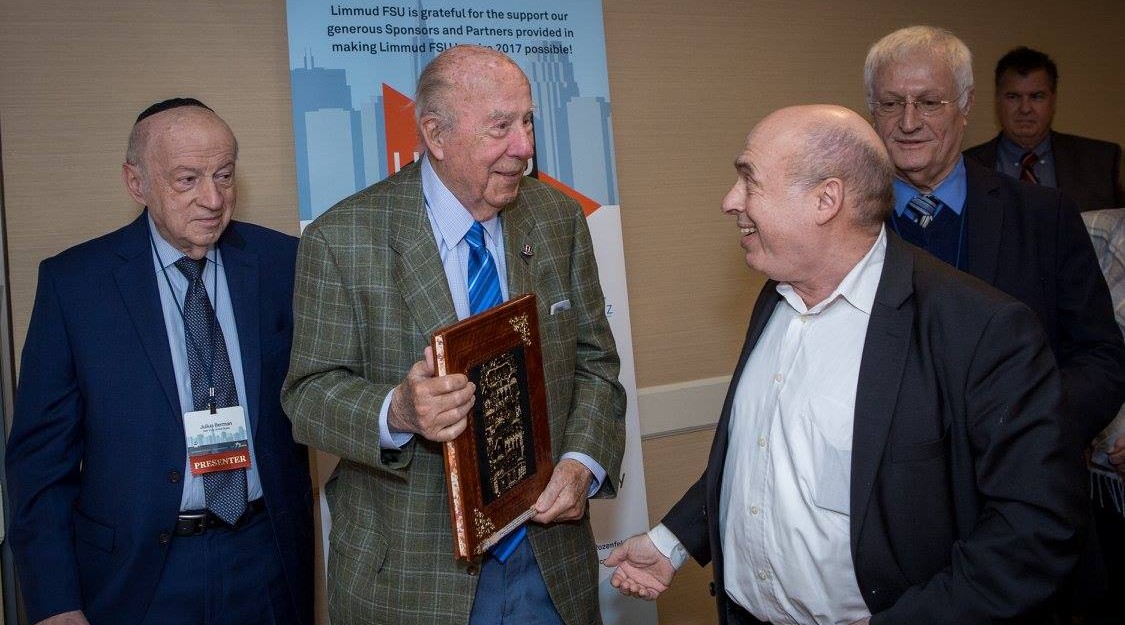TEL AVIV — On Feb. 11, 1986, Soviet refusenik Natan Sharansky — freed after enduring nine years in Russian prisons on false charges of treason and espionage — stepped off a jet that had carried him straight from Germany and out into the Israeli sunshine.
“It was a very dramatic day, starting in a Soviet prison, then meeting my wife in Berlin after 12 years, then finishing at Ben Gurion Airport, and finally visiting the Kotel” in Jerusalem, said Sharansky, recalling the events of 35 years ago as if they were part of a John LeCarré spy thriller. “I was so overwhelmed, I thought maybe it was all a dream.”
While still on the tarmac at Ben Gurion, then-Prime Minister Shimon Peres immediately put Sharansky on the phone with President Ronald Reagan, and then with the secretary of state at the time, George Shultz.
“Why, I thought, wasn’t a conversation with President Reagan enough?” Sharansky quipped. “But Shultz was very helpful to us — how helpful I found out later.”
Indeed, the two men became close friends, and remained so until Shultz’s death on Feb. 6 at the age of 100. Sharansky, 73, was among a dozen prominent Jewish leaders who joined a recent online Zoom tribute to Shultz that was organized by Limmud FSU and moderated by the Jewish international organization’s founder, Chaim Chesler.
“He felt with all his heart that it was his moral obligation to help us,” Sharansky said of Shultz at the Feb. 15 event, noting how Shultz knew many refuseniks by name and always inquired about their well-being in meetings with his Soviet counterparts. “People like him really changed the world’s attitude towards our struggle.”
Thanks to efforts by Shultz and others, Soviet President Mikhail Gorbachev eventually opened the borders and allowed all Jews to leave the USSR. Between 1989 and 2006, an estimated 1.6 million Jews and their relatives and spouses emigrated from the former Soviet Union, 61% of them settling in Israel.
At its West Coast conference in November 2017 in San Francisco, Limmud FSU feted Shultz — who was secretary of state from 1982 to 1989 — for having helped spark the Soviet Jewish exodus. At this month’s tribute, Limmud FSU’s co-founder, Sandy Cahn, said that special occasion, and especially the encounter between Shultz and Sharansky, was the major highlight of the 2017 conference.
“There are lessons that we all can learn from these experiences, and one is the wondrous ability of the human spirit and the importance of never giving up,” said an emotional Shultz, then 97. “President Reagan and I had a great sense of gratitude to the Soviet Jews because they showed us what courage is all about.”
Limmud FSU Chairman Matthew Bronfman said that his own father, the late Edgar Bronfman, traveled numerous times to Moscow throughout the 1980s in his capacity as president of the World Jewish Congress. More than once, he said, the elder Bronfman pressured Gorbachev to free these “prisoners of Zion.” He would have accomplished nothing without Shultz’s blessing, Bronfman said.
“He never let the Soviet authorities forget that for the U.S. government, for him and for President Reagan, the question of Soviet Jews was a very real issue,” Bronfman said. “It was unacceptable to him that Jews could not live freely in the USSR, nor could they emigrate.”
But Shultz first had to earn the trust of American Jews. From 1974 until his 1982 appointment as secretary of state, he was a top executive of the Bechtel Group, an engineering and services company that had multibillion-dollar contracts with the government of Saudi Arabia.

Former Soviet refusenik Natan Sharansky recalls during an online tribute on Feb. 15, 2021 how the late George Shultz “felt with all his heart that it was his moral obligation to help us.” (Limmud FSU)
“I grew up in a home that was very suspicious of American secretaries of state,” David Harris, CEO of the American Jewish Committee, said at this week’s tribute event. “My parents were both Holocaust survivors who were trapped in Europe, and the State Department was not friendly to them and others like them. It took George Shultz to change my mind fundamentally and irreversibly.”
Harris said Shultz “became a hero to the Jewish people.”
Malcolm Hoenlein, vice chairman of the Conference of Presidents of Major American Jewish Organizations and a Limmud FSU board member, said the initial suspicion of Shultz turned into trust.
“It grew to the point where he could not make a trip to the Middle East or Russia without calling us before, often during — even from Damascus — and almost always meeting with us afterwards,” Hoenlein recalled.
One of only two people in U.S. history ever to hold four Cabinet positions, Shultz — along with Reagan — foreshadowed the eventual collapse of the Soviet Union. In 1987, he famously attended a Passover Seder at the residence of the U.S. ambassador in Moscow with about 40 prominent refuseniks, assuring them that “we never give up, we never stop trying” to advance the cause of human rights and promote emigration.
“He felt a special bond to the American Jewish community. Everyone could sense his humility, his integrity, the sincerity of his views, and his commitment and support for Israel,” Hoenlein said. “He laid the groundwork for the special U.S.-Israel relationship of today, but never sought credit or tribute. Trust was his hallmark, and even as late as recent weeks, he said ‘trust is the coin of the realm’ as he bemoaned the acrimony in American politics and society.”
Julius Berman, honorary president of the Conference on Jewish Material Claims Against Germany, recalled vividly how Shultz had called him shortly after returning from high-level talks in Madrid with then-Soviet Foreign Minister Andrei Gromyko.
“He told me that as promised, he raised the issue of Soviet Jewry with the foreign minister, but unfortunately the response was, in effect, ‘It’s none of your damn business. It’s an internal matter and has nothing do to with America or our relationship,’” Berman said.

George Shultz, the former U.S. secretary of state, addresses a Limmud FSU conference in San Francisco in 2017. Shultz died on Feb. 6, 2021 at the age of 100. (Limmud FSU)
But that didn’t stop Shultz from pushing Kremlin leaders on the issue, said Berman, who said of Shultz: “He was the sweetest, kindest person, as soft spoken as possible, and yet you know he carried a big stick. We really owe a great deal of gratitude to everything he did for us.”
The special tribute event was made possible with support from the Genesis Philanthropy Group.
“In giving Soviet Foreign Minister Eduard Shevardnadze a list of refuseniks,” said Dorit Golender, a former Israeli ambassador to Russia and vice-president for community relations at the international philanthropic organization, “George Shultz not only used his influence to support human rights, he demonstrated the importance of solving the issue so America’s civilized dialogue with the USSR could continue.”
Isaac Herzog, chairman of the Jewish Agency for Israel, recalled that during a November 1987 state visit to Washington, his father, Chaim Herzog — then Israel’s president — received a tip from Shultz that an intifada was about to erupt in the West Bank and Gaza. The predicted uprising broke out a month later.
“Shultz was a sworn friend of Israel,” said Herzog, despite his occasional differences with the Israeli government.
Deborah Lipstadt, professor of Holocaust studies at Atlanta’s Emory University, recalled an interview that Shultz gave the Los Angeles Times shortly after his term as secretary of state had ended. Asked to name the most memorable moment of his time in office, he said it was when he received a phone call from refusenik Ida Nudel announcing she was finally “home in Israel.”
“That he told the press this was the highlight of his tenure gives you not only a measure of the man, but also a measure of how important this issue was for him,” Lipstadt said. “We are privileged to have been touched by him.”
Other participants on the Zoom call included prominent refuseniks Sylva Zalmanson and Alexander Kholmiansky; Mark Levin, CEO of the National Coalition Supporting Eurasian Jewry; and Elie Valk, a former Israeli ambassador to Belarus.
JTA has documented Jewish history in real-time for over a century. Keep our journalism strong by joining us in supporting independent, award-winning reporting.
This article was sponsored by and produced in partnership with Limmud FSU, which nurtures open, pluralistic, dynamic learning platforms across the world for Jews of all ages and backgrounds with roots in the former Soviet Union, while embracing the Jewish intellectual, cultural and religious traditions grounded in this shared experience. This article was produced by JTA’s native content team.
More from Limmud FSU





